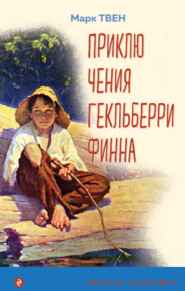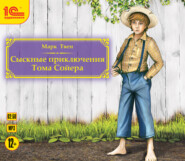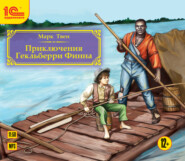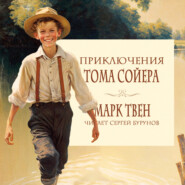По всем вопросам обращайтесь на: info@litportal.ru
(©) 2003-2024.
✖
Приключения Тома Сойера / The Adventures of Tom Sawyer
Настройки чтения
Размер шрифта
Высота строк
Поля
Приключения Тома Сойера / The Adventures of Tom Sawyer
Марк Твен
Н. А. Самуэльян
Бестселлер на все времена
Чтение оригинальных произведений – простой и действенный способ погрузиться в языковую среду и совершенствоваться в иностранном языке. Серия «Бестселлер на все времена» – это возможность улучшить свой английский, читая лучшие произведения англоязычных авторов, любимые миллионами читателей. Для лучшего понимания текста в книгу включены краткий словарь и комментарии, поясняющие языковые и лингвострановедческие вопросы, исторические и культурные реалии описываемой эпохи.
«Приключения Тома Сойера» – это калейдоскоп удивительных происшествий, невероятных открытий, забавных суеверий, мальчишеских амбиций, нелегких испытаний и трудных решений. А еще это воспоминание о том, каким ярким и удивительным бывает мир в детстве, когда любой уголок может стать пиратской пещерой, а в укромном месте, если хорошенько покопать, можно отыскать клад.
Книга предназначена для тех, кто изучает английский язык на продолжающем или продвинутом уровне и стремится к его совершенствованию.
Марк Твен / Mark Twain
Приключения Тома Сойера / The Adventures of Tom Sawyer
Комментарии и словарь Я. Самуэльян
© ООО «Издательство «Эксмо», 2017
* * *
Читайте «Бестселлер на все времена» – погрузитесь в языковую среду с лучшими произведениями любимых авторов!
«Языковая компетенция – вещь капризная. Это как балет, как умение играть на музыкальном инструменте, как гимнастика, как любое действие, которое требует навыка. Либо вы идете вперед, либо начинаете сползать назад.
А самое главное – не прекращать изучение языка. Это может быть чтение оригинальной литературы. Любите читать про любовь – читайте про любовь, любите фантастику – читайте фантастику. Но читайте обязательно!»
Н. А. Бонк, лингвист, педагог,
автор наиболее популярных в России
учебников английского языка
Preface
Most of the adventures recorded in this book really occurred; one or two were experiences of my own, the rest those of boys who were schoolmates of mine. Huck Finn is drawn from life; Tom Sawyer also, but not from an individual – he is a combination of the characteristics of three boys whom I knew, and therefore belongs to the composite order of architecture.
The odd superstitions touched upon were all prevalent among children and slaves in the West at the period of this story – that is to say, thirty or forty years ago.
Although my book is intended mainly for the entertainment of boys and girls, I hope it will not be shunned by men and women on that account, for part of my plan has been to try to pleasantly remind adults of what they once were themselves, and of how they felt and thought and talked, and what queer enterprises they sometimes engaged in.
THE AUTHOR. HARTFORD, 1876.
Chapter I
‘TOM!’
No answer.
‘TOM!’
No answer.
‘What’s gone with that boy, I wonder? You TOM!’
No answer.
The old lady pulled her spectacles down and looked over them about the room; then she put them up and looked out under them. She seldom or never looked THROUGH them for so small a thing as a boy; they were her state pair, the pride of her heart, and were built for ‘style,’ not service – she could have seen through a pair of stove-lids just as well. She looked perplexed for a moment, and then said, not fiercely, but still loud enough for the furniture to hear:
‘Well, I lay if I get hold of you I’ll —’
She did not finish, for by this time she was bending down and punching under the bed with the broom, and so she needed breath to punctuate the punches with. She resurrected nothing but the cat.
‘I never did see the beat of that boy!’
She went to the open door and stood in it and looked out among the tomato vines and ‘jimpson’ weeds that constituted the garden. No Tom. So she lifted up her voice at an angle calculated for distance and shouted: ‘Y-o-u-u TOM!’
There was a slight noise behind her and she turned just in time to seize a small boy by the slack of his roundabout[1 - Roundabout – короткий облегающий пиджак.] and arrest his flight.
‘There! I might ‘a’ thought of that closet. What you been doing in there?’
‘Nothing.’
‘Nothing! Look at your hands. And look at your mouth. What IS that truck?’
‘I don’t know, aunt.’
‘Well, I know. It’s jam – that’s what it is. Forty times I’ve said if you didn’t let that jam alone I’d skin you. Hand me that switch.’
The switch hovered in the air – the peril was desperate.
‘My! Look behind you, aunt!’
The old lady whirled round, and snatched her skirts out of danger. The lad fled on the instant, scrambled up the high board-fence, and disappeared over it.
His aunt Polly stood surprised a moment, and then broke into a gentle laugh.
‘Hang the boy, can’t I never learn anything? Ain’t he played me tricks enough like that for me to be looking out for him by this time? But old fools is the biggest fools there is. Can’t learn an old dog new tricks, as the saying is. But my goodness, he never plays them alike, two days, and how is a body to know what’s coming? He ‘pears to know just how long he can torment me before I get my dander up, and he knows if he can make out to put me off for a minute or make me laugh, it’s all down again and I can’t hit him a lick. I ain’t doing my duty by that boy, and that’s the Lord’s truth, goodness knows. Spare the rod and spile the child, as the Good Book[2 - the Good Book – Библия, собрание священных текстов иудаизма и христианства.] says. I’m a laying up sin and suffering for us both, I know. He’s full of the Old Scratch,[3 - the Old Scratch – дьявол, сатана.] but laws-a-me! he’s my own dead sister’s boy, poor thing, and I ain’t got the heart to lash him, somehow. Every time I let him off, my conscience does hurt me so, and every time I hit him my old heart most breaks. Well-a-well, man that is born of woman is of few days and full of trouble, as the Scripture[4 - the Scripture – Священное Писание, Библия, любая священная книга.] says, and I reckon it’s so. He’ll play hookey this evening,[5 - South-western for ‘afternoon.’ (MT)] and I’ll just be obleeged to make him work, to-morrow, to punish him. It’s mighty hard to make him work Saturdays, when all the boys is having holiday, but he hates work more than he hates anything else, and I’ve GOT to do some of my duty by him, or I’ll be the ruination of the child.’
Tom did play hookey, and he had a very good time. He got back home barely in season to help Jim, the small colored boy, saw next-day’s wood and split the kindlings before supper – at least he was there in time to tell his adventures to Jim while Jim did three-fourths of the work. Tom’s younger brother (or rather half-brother) Sid was already through with his part of the work (picking up chips), for he was a quiet boy, and had no adventurous, troublesome ways.
While Tom was eating his supper, and stealing sugar as opportunity offered, Aunt Polly asked him questions that were full of guile, and very deep – for she wanted to trap him into damaging revealments. Like many other simple-hearted souls, it was her pet vanity to believe she was endowed with a talent for dark and mysterious diplomacy, and she loved to contemplate her most transparent devices as marvels of low cunning. Said she:
‘Tom, it was middling warm in school, warn’t it?’
‘Yes’m.’
‘Powerful warm, warn’t it?’
‘Yes’m.’
Марк Твен
Н. А. Самуэльян
Бестселлер на все времена
Чтение оригинальных произведений – простой и действенный способ погрузиться в языковую среду и совершенствоваться в иностранном языке. Серия «Бестселлер на все времена» – это возможность улучшить свой английский, читая лучшие произведения англоязычных авторов, любимые миллионами читателей. Для лучшего понимания текста в книгу включены краткий словарь и комментарии, поясняющие языковые и лингвострановедческие вопросы, исторические и культурные реалии описываемой эпохи.
«Приключения Тома Сойера» – это калейдоскоп удивительных происшествий, невероятных открытий, забавных суеверий, мальчишеских амбиций, нелегких испытаний и трудных решений. А еще это воспоминание о том, каким ярким и удивительным бывает мир в детстве, когда любой уголок может стать пиратской пещерой, а в укромном месте, если хорошенько покопать, можно отыскать клад.
Книга предназначена для тех, кто изучает английский язык на продолжающем или продвинутом уровне и стремится к его совершенствованию.
Марк Твен / Mark Twain
Приключения Тома Сойера / The Adventures of Tom Sawyer
Комментарии и словарь Я. Самуэльян
© ООО «Издательство «Эксмо», 2017
* * *
Читайте «Бестселлер на все времена» – погрузитесь в языковую среду с лучшими произведениями любимых авторов!
«Языковая компетенция – вещь капризная. Это как балет, как умение играть на музыкальном инструменте, как гимнастика, как любое действие, которое требует навыка. Либо вы идете вперед, либо начинаете сползать назад.
А самое главное – не прекращать изучение языка. Это может быть чтение оригинальной литературы. Любите читать про любовь – читайте про любовь, любите фантастику – читайте фантастику. Но читайте обязательно!»
Н. А. Бонк, лингвист, педагог,
автор наиболее популярных в России
учебников английского языка
Preface
Most of the adventures recorded in this book really occurred; one or two were experiences of my own, the rest those of boys who were schoolmates of mine. Huck Finn is drawn from life; Tom Sawyer also, but not from an individual – he is a combination of the characteristics of three boys whom I knew, and therefore belongs to the composite order of architecture.
The odd superstitions touched upon were all prevalent among children and slaves in the West at the period of this story – that is to say, thirty or forty years ago.
Although my book is intended mainly for the entertainment of boys and girls, I hope it will not be shunned by men and women on that account, for part of my plan has been to try to pleasantly remind adults of what they once were themselves, and of how they felt and thought and talked, and what queer enterprises they sometimes engaged in.
THE AUTHOR. HARTFORD, 1876.
Chapter I
‘TOM!’
No answer.
‘TOM!’
No answer.
‘What’s gone with that boy, I wonder? You TOM!’
No answer.
The old lady pulled her spectacles down and looked over them about the room; then she put them up and looked out under them. She seldom or never looked THROUGH them for so small a thing as a boy; they were her state pair, the pride of her heart, and were built for ‘style,’ not service – she could have seen through a pair of stove-lids just as well. She looked perplexed for a moment, and then said, not fiercely, but still loud enough for the furniture to hear:
‘Well, I lay if I get hold of you I’ll —’
She did not finish, for by this time she was bending down and punching under the bed with the broom, and so she needed breath to punctuate the punches with. She resurrected nothing but the cat.
‘I never did see the beat of that boy!’
She went to the open door and stood in it and looked out among the tomato vines and ‘jimpson’ weeds that constituted the garden. No Tom. So she lifted up her voice at an angle calculated for distance and shouted: ‘Y-o-u-u TOM!’
There was a slight noise behind her and she turned just in time to seize a small boy by the slack of his roundabout[1 - Roundabout – короткий облегающий пиджак.] and arrest his flight.
‘There! I might ‘a’ thought of that closet. What you been doing in there?’
‘Nothing.’
‘Nothing! Look at your hands. And look at your mouth. What IS that truck?’
‘I don’t know, aunt.’
‘Well, I know. It’s jam – that’s what it is. Forty times I’ve said if you didn’t let that jam alone I’d skin you. Hand me that switch.’
The switch hovered in the air – the peril was desperate.
‘My! Look behind you, aunt!’
The old lady whirled round, and snatched her skirts out of danger. The lad fled on the instant, scrambled up the high board-fence, and disappeared over it.
His aunt Polly stood surprised a moment, and then broke into a gentle laugh.
‘Hang the boy, can’t I never learn anything? Ain’t he played me tricks enough like that for me to be looking out for him by this time? But old fools is the biggest fools there is. Can’t learn an old dog new tricks, as the saying is. But my goodness, he never plays them alike, two days, and how is a body to know what’s coming? He ‘pears to know just how long he can torment me before I get my dander up, and he knows if he can make out to put me off for a minute or make me laugh, it’s all down again and I can’t hit him a lick. I ain’t doing my duty by that boy, and that’s the Lord’s truth, goodness knows. Spare the rod and spile the child, as the Good Book[2 - the Good Book – Библия, собрание священных текстов иудаизма и христианства.] says. I’m a laying up sin and suffering for us both, I know. He’s full of the Old Scratch,[3 - the Old Scratch – дьявол, сатана.] but laws-a-me! he’s my own dead sister’s boy, poor thing, and I ain’t got the heart to lash him, somehow. Every time I let him off, my conscience does hurt me so, and every time I hit him my old heart most breaks. Well-a-well, man that is born of woman is of few days and full of trouble, as the Scripture[4 - the Scripture – Священное Писание, Библия, любая священная книга.] says, and I reckon it’s so. He’ll play hookey this evening,[5 - South-western for ‘afternoon.’ (MT)] and I’ll just be obleeged to make him work, to-morrow, to punish him. It’s mighty hard to make him work Saturdays, when all the boys is having holiday, but he hates work more than he hates anything else, and I’ve GOT to do some of my duty by him, or I’ll be the ruination of the child.’
Tom did play hookey, and he had a very good time. He got back home barely in season to help Jim, the small colored boy, saw next-day’s wood and split the kindlings before supper – at least he was there in time to tell his adventures to Jim while Jim did three-fourths of the work. Tom’s younger brother (or rather half-brother) Sid was already through with his part of the work (picking up chips), for he was a quiet boy, and had no adventurous, troublesome ways.
While Tom was eating his supper, and stealing sugar as opportunity offered, Aunt Polly asked him questions that were full of guile, and very deep – for she wanted to trap him into damaging revealments. Like many other simple-hearted souls, it was her pet vanity to believe she was endowed with a talent for dark and mysterious diplomacy, and she loved to contemplate her most transparent devices as marvels of low cunning. Said she:
‘Tom, it was middling warm in school, warn’t it?’
‘Yes’m.’
‘Powerful warm, warn’t it?’
‘Yes’m.’

















